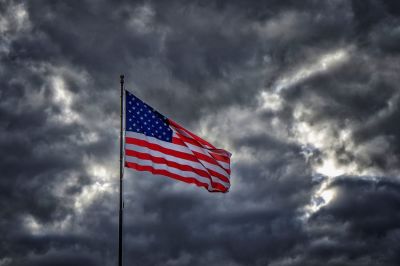Poll shows American values changed drastically during pandemic

What happened during the pandemic?
According to a new poll, it looks like there was a seismic change in America’s values during the past few years.
In August 2019, mere months before the COVID-19 pandemic would shatter normal life in America, 89% of Americans thought hard work was very important, according to a Wall Street Journal/NBC News poll. Sixty-two percent of Americans saw community involvement as very important. Over 6 out of 10 Americans thought patriotism was very important. Almost half of Americans (48%) saw religion as very important, and 43% saw having children as very important.
A new Wall Street Journal poll, conducted by NORC at the University of Chicago, finds that support for all those values has plummeted.
Now, two-thirds of Americans (67%) see hard work as being very important. Only 38% see patriotism as very important. When it comes to religion and having children, it’s now 39% and 30%, respectively, who see those matters as very important.
And forget about community involvement: Only just over a quarter of Americans now think that’s important.
What changed?
The poll was first conducted in 1998 — and, not surprisingly, wide swings occurred between 1998 and 2019. In those 21 years, America experienced a recession, increasing social liberalism, the horrors of 9/11, and the advent of smartphones, among other things.
Yet in three and a half years, the latest poll indicates, America seemed to change more drastically than it did in the prior 21 years.
Of course, what happened in 2020, 2021, and 2022 was immense. Government-mandated shutdowns of schools and private businesses and forced mask-wearing. Closed churches, even for Christianity’s holiest day, Easter. Warnings about all gatherings — until racism was considered a greater threat than COVID-19 in the aftermath of George Floyd’s death. Crime escalating. Government-funded checks going to people who stopped working during the pandemic. Black Lives Matter-inspired riots, and then a riot at the Capitol (to be followed by different standards of justice for the Americans involved). Parents mad at school boards compared to terrorists by the Justice Department.
Was the pandemic a blip? This poll suggests that no, the pandemic (and our response to it) wasn’t just a one-time matter, but a trajectory-altering event for our country.
And not in a good way.
Hard work has long undergirded the American dream. Community involvement, too, has been one of our most unique and fruitful characteristics. In his classic “Democracy in America,” 19th-century French philosopher and historian Alexis de Tocqueville wrote:
Americans of all ages, all conditions, all minds constantly unite. Not only do they have commercial and industrial associations in which all take part, but they also have a thousand other kinds: religious, moral, grave, futile, very general and very particular, immense and very small; Americans use associations to give fêtes, to found seminaries, to build inns, to raise churches, to distribute books, to send missionaries to the antipodes; in this manner they create hospitals, prisons, schools.
Tocqueville saw this as a key trait of America, and one crucial to maintaining civilization. He wrote:
If men who live in democratic countries had neither the right nor the taste to unite in political goals, their independence would run great risks, but they could preserve their wealth and their enlightenment for a long time; whereas if they did not acquire the practice of associating with each other in ordinary life, civilization itself would be in peril. A people among whom particular persons lost the power of doing great things in isolation, without acquiring the ability to produce them in common, would soon return to barbarism.
Religion, too, is crucial to the American idea. In his farewell address, President George Washington described religion and morality as “indispensable supports” for “political prosperity.” Nor was he of the view that a secular nation could have a robust morality: “Reason and experience both forbid us to expect that national morality can prevail in exclusion of religious principle,” our first president warned.
And well, obviously, it’s a bad sign for a nation when patriotism and the importance of children decline.
What this poll shows is that there wasn’t just exterior unrest during the pandemic. Clearly, people were affected by the decisions made by those in authority, and those decisions and actions influenced their own values and beliefs.
There’s no way to reverse the clock, to change how the government handles the pandemic, to urge religious leaders to reconsider the message that closing churches sends, to beg Americans fighting over mask-wearing to realize the great importance of community.
But as we struggle to figure out how to win our fellow Americans back to belief in the importance of religion, patriotism, hard work, and community involvement, let’s keep this in mind: What worked in 2019 probably will fall on deaf ears today.
It’s a brave new America — and that’s a chilling reality we shouldn’t forget.
Originally published at The Daily Signal.
Katrina Trinko is editor-in-chief of The Daily Signal and co-host of The Daily Signal Podcast. Send an email to Katrina.




















